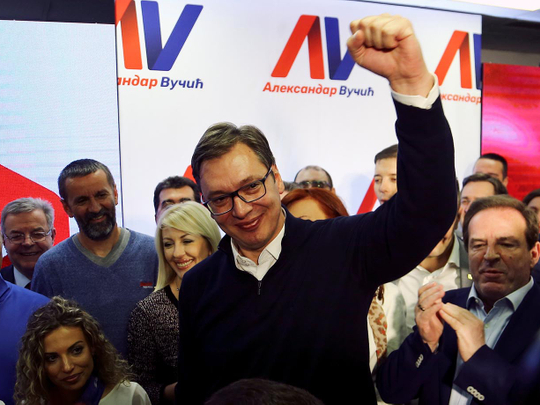
Belgrade: Prime Minister Aleksandar Vucic claimed the Serbian presidency on Sunday as a poll showed him to be the clear winner despite accusations that he would steer the country towards authoritarian rule.
According to the IPSOS research institute Vucic won about 55 percent of the vote, far above the 50 percent threshold required to win in the first round.
“We can say that he is elected president,” Marko Uljarevic of IPSOS told AFP.
Former ombudsman Sasa Jankovic was projected to come in second with about 16 percent.
Vucic, 47, will have a five-year term as president. In Serbia, the post is largely ceremonial but analysts say he will use it to consolidate his grip on power, including with his eventual pick for prime minister.
A hardline nationalist who became a pro-European, Vucic wants to negotiate Serbia’s accession to the EU but keep close ties with the country’s traditional ally, Moscow.
“I am very proud of the fact that we have won the overwhelming trust of the citizens of Serbia... (which shows) the direction in which Serbia wants to go,” a thrilled Vucic said in his victory speech in the party headquarters.
“The vast majority of Serbia’s citizens are for the continuation of reform, for Serbia to keep to its European path and maintain the links that we have with Russia and China,” he said.
He thanked German Chancellor Angela Merkel and Russian President Vladimir Putin for having received him during the campaign.
Opposition parties had warned during the campaign against putting too much power in one man’s hands, but Vucic dismissed the accusations Sunday.
“They can say whatever they want. I will respect Serbia’s constitution. That is my obligation and that is what I will do,” he told reporters after casting his ballot.
Many of Vucic’s challengers garnered fewer votes than surveys had predicted: Vuk Jeremic, a former foreign minister, won 5.8 percent, while the ultranationalist Vojislav Seselj won 4.4 percent.
But Luka Maksimovic, a 25-year-old satirist who ran as the fictional Ljubisa Preletacevic - nicknamed “Beli” (White) - took 9.3 percent of the vote.
Dressed in a Borat-type white suit with a samurai-style ponytail and hipster beard, he had promised voters “to steal for myself but give something to the people too.”
Aggressive campaign
During his campaign, Vucic touted Serbia’s economic success since he became prime minister in 2014, with growth of 2.8 percent last year, and his efforts to bolster public finances.
But the average Serbian earns about 330 euros ($350) a month while unemployment is running above 15 percent.
Vucic had also run a typically aggressive campaign, with one of his videos showing a plane marked “Serbia 2017” about to crash because a lack of leadership.
He accused opponents of receiving “millions of euros (from) certain foreign countries”, without offering details.
Both the opposition and independent media monitoring groups have cried foul over Vucic’s omnipresence in the media.
In the week leading up to the vote, national TV channels devoted 51 percent of their airtime to Vucic, more than all the other candidates put together, according to analysis by the Kliping research agency published in the Danas daily.
That rose to 67 percent when his appearances as prime minister were taken into account, added the analysis.
On Thursday, the last day of the campaign, all but two of the dozen or so national dailies appeared wrapped in full-page ads reading: “On April 2, give a decisive vote to Aleksandar Vucic.”
Ex-ombudsman Jankovic, seen as a key Vucic rival, is now widely expected to emerge as a new leader of an otherwise weak and divided opposition.
He has claimed that public-sector workers were intimidated ahead of the vote.
Jankovic, 46, an independent candidate supported by the centre-left Democratic Party, won support among the urban middle class and liberals opposed to Vucic, in large part by criticising the authorities and insisting on their accountability.












